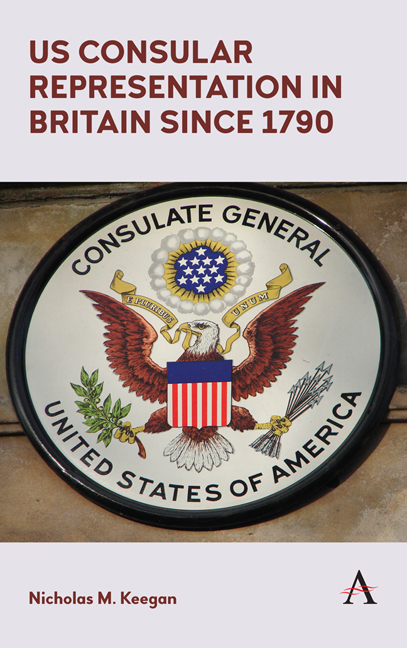Book contents
- Frontmatter
- Dedication
- Contents
- List of Illustrations
- Foreword
- Preface
- Acknowledgements
- Introduction
- PART 1
- PART 2
- PART 3
- Chapter Six Consular Posts and Consular Agencies in Major Cities
- Chapter Seven Belfast
- Chapter Eight Birmingham
- Chapter Nine Bradford
- Chapter Ten Bristol
- Chapter Eleven Cardiff
- Chapter Twelve Dublin
- Chapter Thirteen Dundee
- Chapter Fourteen Dunfermline
- Chapter Fifteen Edinburgh and Leith
- Chapter Sixteen Falmouth
- Chapter Seventeen Liverpool
- Chapter Eighteen London
- Chapter Nineteen Newcastle upon Tyne
- Chapter Twenty Southampton
- Chapter Twenty-One Stoke on Trent
- Chapter Twenty-Two An Evolving, Adaptive Service
- Appendix: Locations and Categories of Consular Offices
- Notes
- Sources
- Bibliography
- Index
Chapter Eighteen - London
from PART 3
Published online by Cambridge University Press: 21 June 2018
- Frontmatter
- Dedication
- Contents
- List of Illustrations
- Foreword
- Preface
- Acknowledgements
- Introduction
- PART 1
- PART 2
- PART 3
- Chapter Six Consular Posts and Consular Agencies in Major Cities
- Chapter Seven Belfast
- Chapter Eight Birmingham
- Chapter Nine Bradford
- Chapter Ten Bristol
- Chapter Eleven Cardiff
- Chapter Twelve Dublin
- Chapter Thirteen Dundee
- Chapter Fourteen Dunfermline
- Chapter Fifteen Edinburgh and Leith
- Chapter Sixteen Falmouth
- Chapter Seventeen Liverpool
- Chapter Eighteen London
- Chapter Nineteen Newcastle upon Tyne
- Chapter Twenty Southampton
- Chapter Twenty-One Stoke on Trent
- Chapter Twenty-Two An Evolving, Adaptive Service
- Appendix: Locations and Categories of Consular Offices
- Notes
- Sources
- Bibliography
- Index
Summary
Although London is the capital city of the United Kingdom it was not the first British city to have an operational American consulate. As we have seen, that honour goes to Liverpool. However, the new US republic had its first diplomatic, as opposed to consular, presence in London and established its legation there in 1785, headed by John Adams of Massachusetts as minister plenipotentiary. In 1893, the legation was upgraded to an embassy and was headed by Thomas F. Bayard of Delaware as ambassador extraordinary and plenipotentiary.
The first consul in London was Joshua Johnson, a merchant. A native of Maryland, he had moved to London in 1771 as resident partner of the Annapolis merchant firm of Wallace, Davidson, and Johnson. He terminated the partnership in 1774 and he and his family moved to Nantes, in France, where he continued as a merchant from 1778 to 1783. In 1781, he formed a new partnership under the name of Wallace, Johnson, and Muir then returned to London with his family in 1783 and continued with the partnership until January 1790. In August of that year he was appointed consul in London, with offices at 8 Cowper's [or Cooper's] Row, Crutched Friars, Tower Hill. Secretary of State Thomas Jefferson reminded Johnson of the importance of the appointment, since the United States had ‘no diplomatic character at that court’ at that time. Accordingly, Johnson was expected to undertake more than the usual consular functions involving commerce and navigation. Jefferson informed him that ‘in your position we must desire something more’. And the ‘something more’ was ‘Political intelligence from that country is interesting to us in a high degree. We must therefore ask you to furnish us with this as far as you shall be able.’ Although agreeing to do so, Johnson said that as Jefferson would know from personal experience of living in France that it was difficult to obtain reliable information without spending considerable amounts of money. This would be ‘inconsistent with my pursuits and not justifiable to my Family’. He returned to the question of finance, noting that Congress was considering a bill to define the duties of consuls and their fees but it had been defeated by the Senate.
- Type
- Chapter
- Information
- US Consular Representation in Britain since 1790 , pp. 185 - 204Publisher: Anthem PressPrint publication year: 2018



